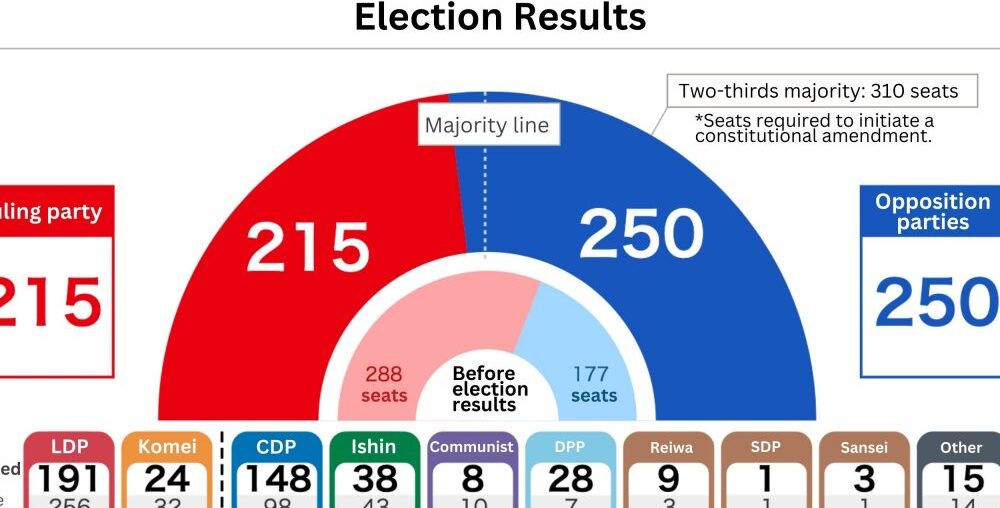Japan’s electorate spoke in the nation’s 50th general election on Sunday, October 27, and the results are surely not to the ruling parties’ liking. Prime Minister Shigeru Ishiba had called the vote as a referendum on his administration’s credibility. He had also defined victory as a majority for the ruling Liberal Democratic Party (LDP) and its Komeito partner. However, they fell far short of that target.
This was the LDP’s biggest election defeat since the 2009 Lower House election when the opposition drove it from power. Prime Minister Ishiba must take the election results seriously.
Out of 465 seats in the Lower House, the LDP and its coalition partner held 288 going into the October 27 election. They needed a combined 233 to maintain their current majority. However, the LDP lost 65 seats on Sunday, and Komeito also dropped 8 seats in the Lower House. Together they fall short of a majority with only 215 seats.
Meanwhile, the Constitutional Democratic Party of Japan (CDP) made great gains. It added 50 new seats, for a total of 148. Also, the Democratic Party for the People (DPP) quadrupled its number of seats from 7 to 28. While not a coalition, all of the opposition parties together totaled 250 seats after the October 27 election.
International conditions are severe and becoming increasingly chaotic. In the coming days, an extraordinary session of the Diet will formally choose the prime minister. Above all, the political parties must work to establish a stable government. Japan cannot afford to see its security compromised because national politics have become bogged down.
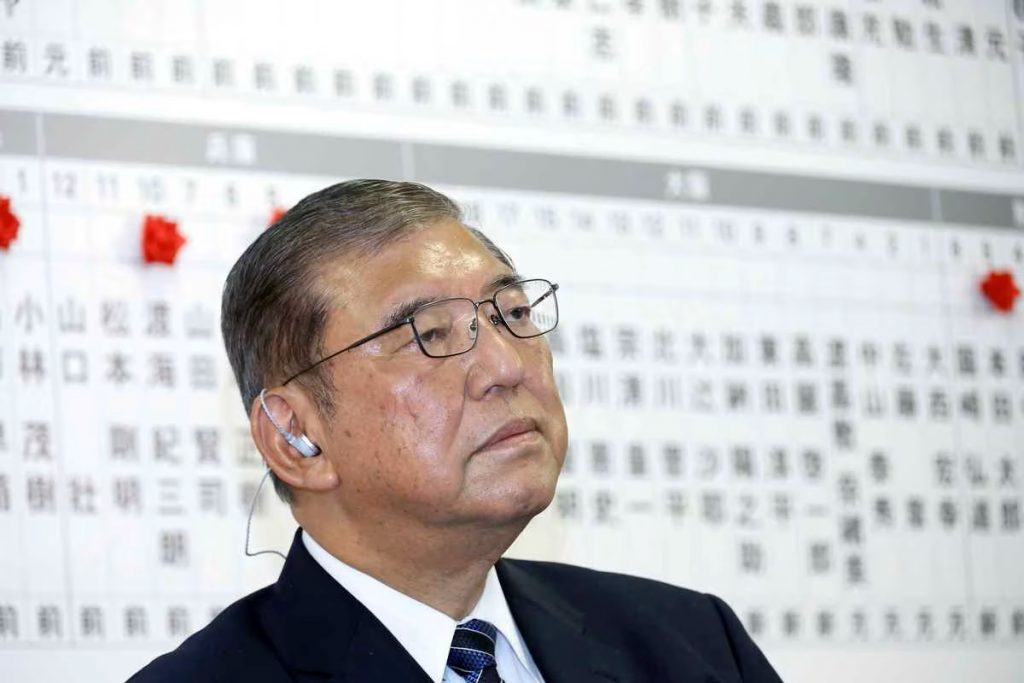

Excuses Do Not Win Elections
Ishiba is expected to seek endorsements from winners the LDP had officially refused to endorse. However, whether he can succeed or not is unclear.
A major reason for this crushing defeat is that Prime Minister Ishiba and the LDP executive team made it into an “excuse election.” Winning such an excuse election was a hopeless endeavor from the start.
Voters were angered by the failure of politicians belonging to the Abe faction and other former LDP factions to report income from faction-sponsored parties. The Prime Minister then failed to deal effectively with the issue. After taking office, he increased the number of lawmakers delisted from the LDP’s official list of supported candidates. Then he forbade them from running for specific districts and in proportional representation contests at the same time.
Moreover, instead of making a decision and sticking to it, Ishiba let the tumult continue. That is one reason why public attention has been dominated by discussion of “politics and money.”
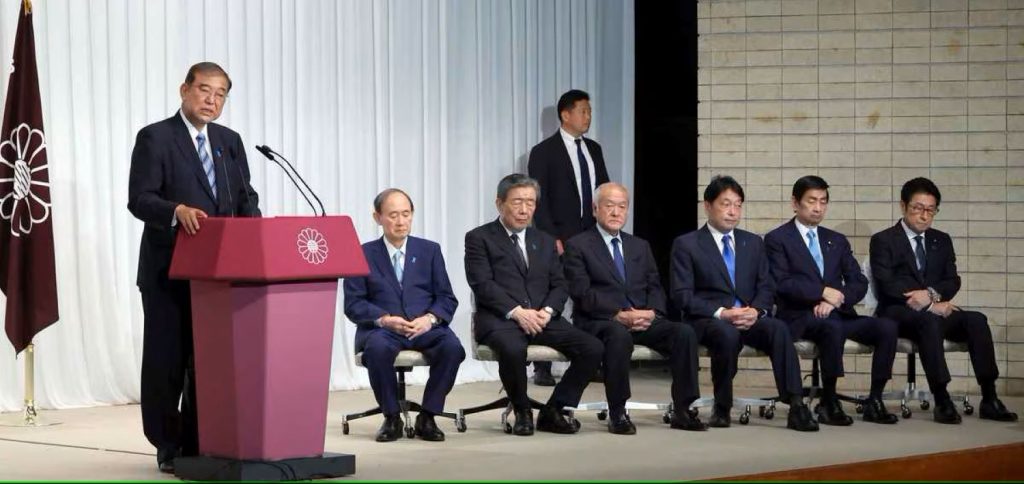

Sowing Division and Confusion
In the final stages of the election campaign, reports revealed that the LDP paid ¥20 million JPY ($130,500 USD) to party branches for operating expenses. However, the head of one branch was one of the candidates the LDP had not officially endorsed. Ishiba tried to explain, saying this money was earmarked for expanding the LDP’s influence and “not for election purposes.”
That incident might also have swayed voter behavior. Within the LDP, doubts were raised about the judgment of Prime Minister Ishiba. He and Secretary-General Hiroshi Moriyama seemed not to consider how their actions would be viewed by voters and the other parties.
Prime Minister Ishiba also failed to build a cooperative relationship with former Minister of Economic Security Sanae Takaichi. Furthermore, he failed to cr ate a party-wide sense of inclusivity through his Cabinet appointments.
The early dissolution of the Diet was another factor contributing to doubts about the Ishiba government. After talking about debating policy, Ishiba dissolved the Diet without providing a chance to engage the parties in sufficient debate.
All these missteps alienated core LDP supporters. According to polls, some supporters cast their votes for the Conservative Party of Japan (Nippon Hoshuto) and the Political Participation Party (Sanseito) instead of the LDP.
How the Ishiba administration expected to triumph in the election after all that defies belief.
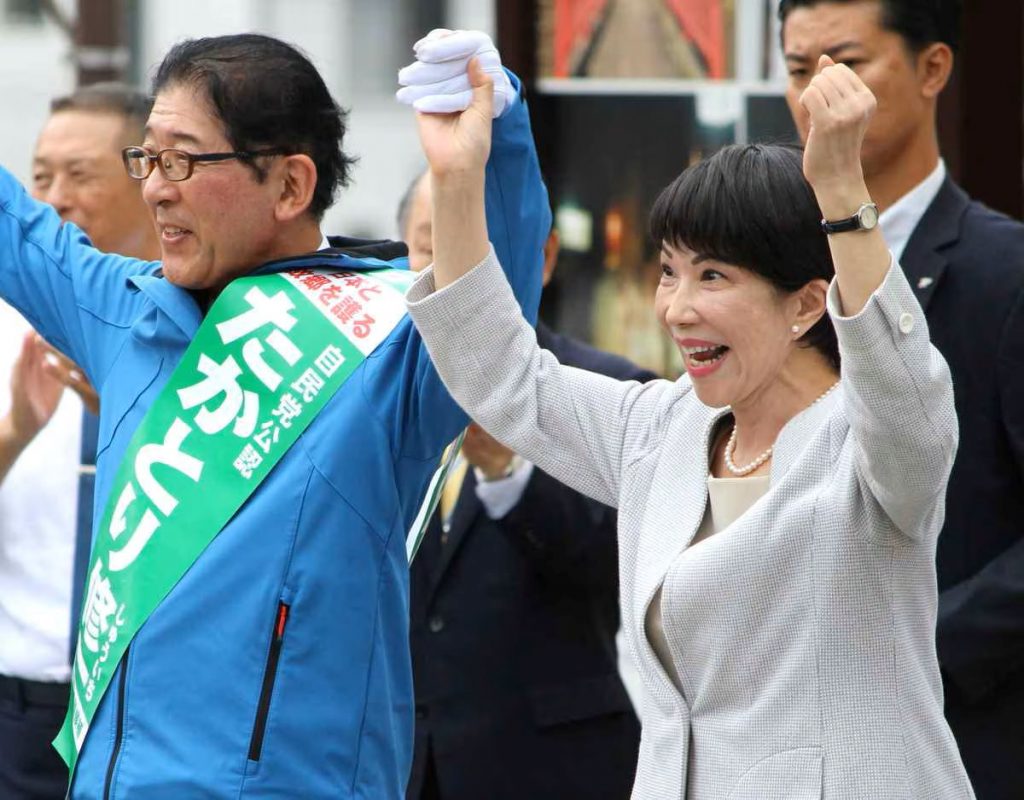

The Public Wants Reform
The Lower House election once again demonstrated how voters remain infuriated over the issue of politics and money. Japan’s various parties should agree on concrete measures for political reform and put them into action as soon as possible. Failure to do this will only exacerbate distrust in politics.
But there is another reason why this election turned into an “excuse election.” Prime Minister Ishiba’s problems go beyond just politics and money. That he failed to raise any policy issues was equally important to the public.
A general election is always a contest to choose a government that will determine the course of Japan’s future. Thus, the independence and prosperity of Japan and the lives and livelihoods of its people are very much at stake.
Despite all that was at stake, no serious debate took place regarding the course Japan should take. Above all, it was unfortunate that the security policies needed to protect Japan were not discussed.
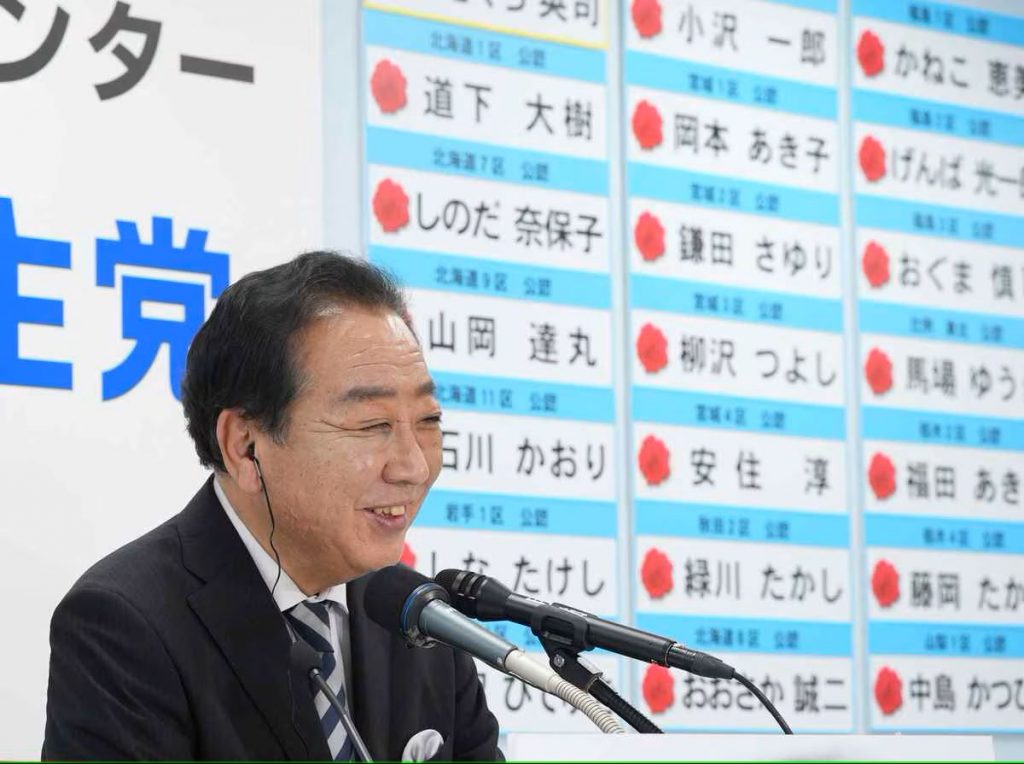

Would the CDP Safeguard the Nation?
Concerns about a possible Taiwan contingency are growing. The day before the election was announced, the Chinese military conducted a large-scale exercise surrounding Taiwan. Diet members elected on October 27 may well be directly confronted with an emergency involving Taiwan.
Elements of the North Korean military are also expected to participate in Russia’s invasion of Ukraine. Moreover, an emergency on the Korean Peninsula could snowball into a Japan emergency, even involving Russia.
Such potential crises have not been adequately addressed by any of the parties. There has not been any in-depth discussion of concrete deterrent measures, such as drastically strengthening defense capabilities or, most importantly, how best to protect the nation’s citizens. That failure is very disturbing.
The influence of the CDP is on the rise. Party leader Yoshihiko Noda has indicated that he places importance on continuity in foreign and security policies. However, the CDP also takes the position that a limited exercise of the right of collective self-defense is unconstitutional. Furthermore, that party has been critical of Japan possessing defensive counterstrike capabilities.
Is a party with such positions capable of defending the Japanese people and their homeland? Such policy positions are likely to lead to a repeat of the mistakes of the 2009 Democratic Party administration, which plunged the Japan-US alliance into a crisis. It is doubtful that the CDP will have what it takes to govern as long as it clings to such flawed policies.
Reinforcing Economic Recovery
All the political parties proposed measures to combat rising prices, such as reducing the consumption tax and providing subsidies. Nonetheless, they were vague about how they would do that, including how they would fund their proposals. Furthermore, there was a general tenor of just promising handouts.
Everyone’s goal is to achieve wage increases that can keep up with rising prices and ensure a complete escape from deflation. Yet, to achieve that, steps to improve productivity and increase corporate profitability are essential. These are problems that have accumulated over several years. Concrete steps are required to resolve them.
Constitutional Reform
In addition, the movement for constitutional reform must not lose steam. Aside from the LDP’s crushing defeat, the poor performance of the Nippon Ishin no Kai, which has been a strong advocate of constitutional reform, could also have a significant impact.
Nevertheless, the Diet should proceed with codifying the constitutional amendments that are on the table now. These would explicitly recognize the Self-Defense Forces and address the continuity of government in severe emergencies.
RELATED:
(Read the editorial in Japanese.)
Author: Editorial Board, The Sankei Shimbun
